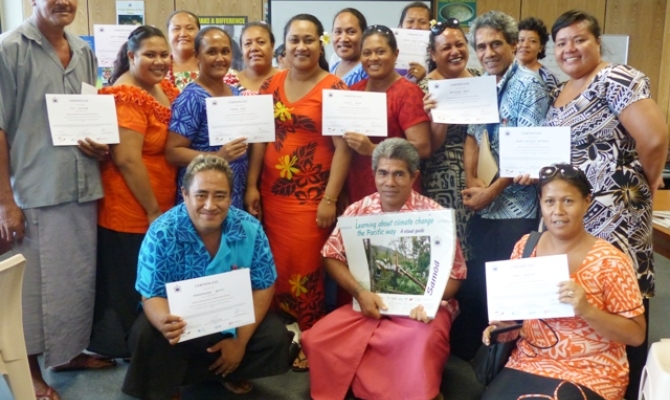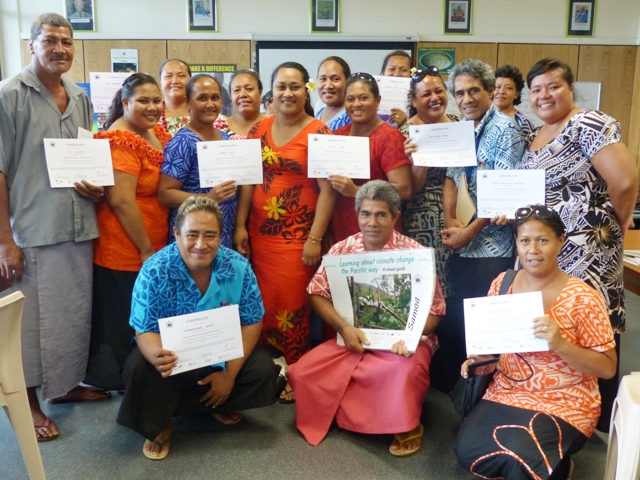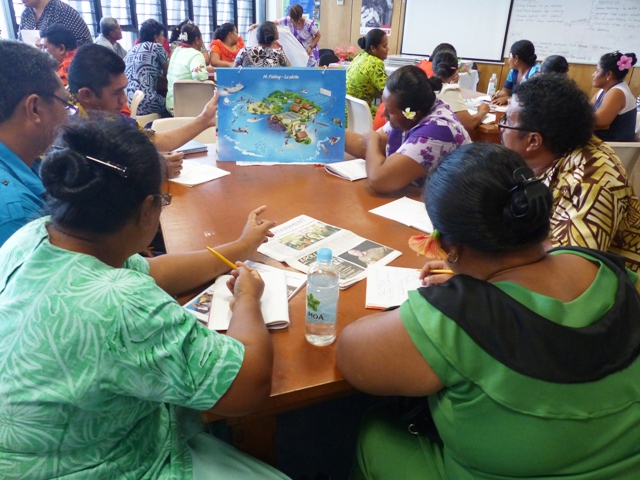
Climate Change Resilience
Over 100 primary and secondary, as well as Education Lecturers of the National University of Samoa and Special Education teachers in Samoa have been trained to implement a Climate Change Educational Resource since November last year.
The Climate Change Educational Resources developed by the German development organisation GIZ in collaboration with the Secretariat of the Pacific Community (SPC) and the Secretariat of the Pacific Regional Environment Programme (SPREP) is tailored to the Pacific island context.

In Samoa it has been designed to support teachers in integrating climate change into the Social Studies and Science curricula for Years 7 and 8.
A series of four teacher training workshops have been held, two in Savaii and two in Upolu, since November with the final workshop ending early this month with teachers receiving their certificates. Upon completion of the training teachers are given two copies of the educational resource for their schools.
Ms. Dawn Su'a from the Ministry of Education, Sports and Culture (MESC) was the facilitator of the four-weeks of training, found the training very revealing.
"The training showed us that there was a lack of basic climate science knowledge among teachers. Many had not even heard of El Nino or La Nina weather patterns, so the teachers really appreciated the course and activities. The activities were student focused which gave teachers new ways of presenting the information to students that ensures student learning objectives are achieved," said Ms. Su'a.
Mrs Ruta Seumanutafa, of Falealili College has been teaching her Year 9 Social Studies students about conserving water in Samoa: "This training has helped me with resources for my classes. It will help the students learn to save water at school and at home. As a pastor's wife, I'll also be able to pass this information on to my church," she said.

Mr. Pauaraisa Talafa'aoti, a teacher from Aleipata College, also found the training very valuable: "We learn and our children learn that we must reduce our green house gas (GHG) emissions to reduce the effects of climate change and natural disasters. GHG's are mainly caused by people."
The principal of Sasatele Primary school, Mr. Titi Alaifea, said that the training was very valuable and necessary for understanding and teaching climate change to the students - "My understanding has increased, and the resources provided will be valuable aids in teaching the curriculum."
Said Mr Herman Timmerman, Adviser for GIZ's Coping with Climate Change in the Pacific Islands Region (CCCPIR) programme: "These trainings are designed to begin the process of preparing the younger generation for the many climate change related challenges that lie ahead. Knowledge is the basis for action, and with the knowledge acquired through these trainings we encourage teachers and students to begin to find ways to address climate change issues at the local level."
The Climate Change Educational Resources developed by the German development organisation GIZ in collaboration with the Secretariat of the Pacific Community (SPC) and the Secretariat of the Pacific Regional Environment Programme (SPREP) is tailored to the Pacific island context.

Teachers with their certificates. On far left is Mr. Titi Alaifea, Principal of Sasatele Primary School
In Samoa it has been designed to support teachers in integrating climate change into the Social Studies and Science curricula for Years 7 and 8.
A series of four teacher training workshops have been held, two in Savaii and two in Upolu, since November with the final workshop ending early this month with teachers receiving their certificates. Upon completion of the training teachers are given two copies of the educational resource for their schools.
Ms. Dawn Su'a from the Ministry of Education, Sports and Culture (MESC) was the facilitator of the four-weeks of training, found the training very revealing.
"The training showed us that there was a lack of basic climate science knowledge among teachers. Many had not even heard of El Nino or La Nina weather patterns, so the teachers really appreciated the course and activities. The activities were student focused which gave teachers new ways of presenting the information to students that ensures student learning objectives are achieved," said Ms. Su'a.
Mrs Ruta Seumanutafa, of Falealili College has been teaching her Year 9 Social Studies students about conserving water in Samoa: "This training has helped me with resources for my classes. It will help the students learn to save water at school and at home. As a pastor's wife, I'll also be able to pass this information on to my church," she said.

Mr. Pauaraisa Talafa'aoti, a teacher from Aleipata College, also found the training very valuable: "We learn and our children learn that we must reduce our green house gas (GHG) emissions to reduce the effects of climate change and natural disasters. GHG's are mainly caused by people."
The principal of Sasatele Primary school, Mr. Titi Alaifea, said that the training was very valuable and necessary for understanding and teaching climate change to the students - "My understanding has increased, and the resources provided will be valuable aids in teaching the curriculum."
Said Mr Herman Timmerman, Adviser for GIZ's Coping with Climate Change in the Pacific Islands Region (CCCPIR) programme: "These trainings are designed to begin the process of preparing the younger generation for the many climate change related challenges that lie ahead. Knowledge is the basis for action, and with the knowledge acquired through these trainings we encourage teachers and students to begin to find ways to address climate change issues at the local level."